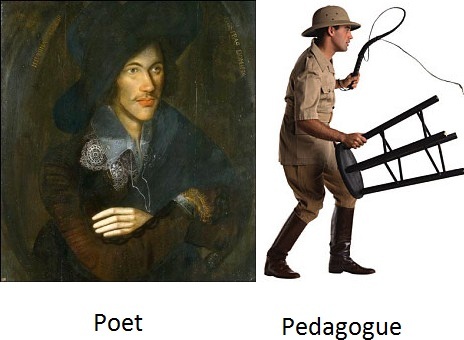.
I have mused over this issue for some time. Why do so many people mistake poets for pedagogues? I have come to the conclusion that pedagogues charge higher rates, and thus the matrons turn to their poet when they have grandchildren who need entertaining.
It is difficult to say no to a valued patron. First she gushes about her grandchildren. Then she mentions in passing that her daughter has dumped them on her for a full month this summer. Finally with moistening eye and trembling limp she wonders whether you could entertain them for a day.
Finally I broke down under the subtly increasing pressure and gave in. I made one or two rules. I would take them for a picnic, we would be accompanied by a maid who would do the technical stuff, (mopping up the vomit, emptying wee out of their shoes, that sort of thing) and as well as a picnic lunch for the children, there would be one for me as well which would include a bottle of wine.
Done like this it isn’t too painful, I would borrow the family coach and it would take us to the Nightbell Gardens near Nightbell Point. These have many advantages, they are pretty, the views impressive, there is a pool for the children, and the clientele is select. You’re never bothered by the street urchins; they shun the place and apparently have legends of unexplained disappearances. This is so convenient that if the stories weren’t already circulating I’d start them myself.
Also one rarely meets poets there, which spares embarrassment. Those whom you do meet are also engaged in the same activity and this ensures mutual silence on the matter.
I had taken several groups of miscellaneous grandchildren to the Nightbell Gardens before the occasion when matters got out of hand. I arrived to collect my charges for that day to discover half a dozen coaches and a bevy of maids, each escorting a small host of children. I nearly fled, but unfortunately my patron spotted me and explained that she was having a small gathering of close friends and this was made possible by my generously volunteering to take their grandchildren off their hands. She pressed silver into my palm. We set off.
I got my charges into the gardens and proceeded to let them and the maids wear each other out. After a frantic hour this was achieved, and I proposed lunch. It was then that I discovered the good news. Each maid had brought a picnic for me, and each included a bottle of wine. I left the maids to eat with their charges and surveyed my lunch. There was enough good cold meat to keep Shena and I going for a week, and the wine would be a useful addition to our cellar.
Once the children had eaten and the inevitable infant had been sick, I checked the tide and realised the pool would soon be prepared. I led them to the pool where Shambling Ert was cleaning it. Ert has the job of draining the pool at every low tide, sweeping it clean and filling it with the rising tide. He’s called Shambling Ert because he’s been crippled since birth, but still moves with surprising speed. He lives a solitary life in the little one room custodian’s cottage next to the pool, and sweeps it twice a day, whatever time the tide.
On other occasions the children have amused themselves hurling dog faeces at him or throwing rubbish into the end that he’d just swept, but on this occasion I was quite proud of them. They just sat still and solemn, occasionally making the sign to avert the evil eye if he looked at them with that ugly visage of his.
Anyway the pool was filled, Ert made his way back to his cottage and the children and maids stripped off and went to frolic in the pool. I sat on the bank, sipped wine and mused about the mutability of fate.
I was sitting there when old Bewan drifted across. He’s one of Port Naain’s professional story tellers. He writes nothing down, but in his memory there is an immense hoard of tales and legends, mainly about the city. I poured him wine and when the children finally tired and came ashore, I told them to get dry and dressed quickly, then we would have another picnic and Bewan would tell them a story.
He started with the story of Phaedus and Lullabah. In the classic version Lullabah subdues all three of her rivals, ties them with her own clothing, strips Caliphelia of her wedding dress and rushes to the Temple of Lah, only to discover too late that it was not Phaedus at the altar but the mad clown Groffik. Obviously for this audience Bewan stressed the high farce and comic antics. He then told the tale of Mili Dumpling, which is perhaps more suitable for a juvenile audience. Then he finished with the tale of the grey ship.
There is an old Port Naain legend about a ghost ship which anchors off Nightbell Point and waits. Then if you have the courage you can row out to it and it will carry you to death and hell where, again, if you manifest the sort of unthinking and suicidal bravery one finds amongst legendary heroes, you can find your lost love and bring her back with you.
However Bewan told them the older legend that the Grey Ship carries a ghastly plague, and if the price isn’t met the captain will tie her up at one of the city wharves and the disease will sweep out and kill everybody in the city.
To pay the price, a dead man must row out to the ship with the soul of a child. With the price paid, the ship sails away.
Anyway this story took us to evening and I packed the children and maids off in their coaches and sat chatting to Bewan. After a while Shambling Ert came out to join us. We shared wine three ways and generally put the world to rights. Finally as it was growing dark we realised we’d have to make our separate ways home. Ert stood up first. “Thank’ee kindly for the wine but now I’m off to prepare my meal for tomorrow and it won’t catch itself.”
Bewan and I made our way down to the shore with the idea of following that round to our homes. Then I noticed in the late evening gloom a ship riding at anchor out beyond the point. I nudged Bewan and pointed it out. He just grunted, “Smuggler. You’ll see a boat rowed out to it soon.”
We waited and sure enough not fifteen minutes later a boat did row out. “It’s Calford, he’s been in league with them for years.” With that Bewan raised an arm and shouted out, “Trade well Calford.”
The dark figure turned in the boat and raised an arm in greeting before continuing to row. Bewan and I walked on, and Bewan commented, “One of the best is Calford, plied his trade for years without getting caught.”
It was true, even the Excise officers had a soft spot for him. I remember one delivering a very moving eulogy at Calford’s funeral perhaps twenty years previously.
♥♥♥♥
Should you wish to read more of life in Port Naain
More of the wit, wisdom and jumbled musings of Tallis Steelyard. Meet a vengeful Lady Bountiful, an artist who smokes only the finest hallucinogenic lichens, and wonder at the audacity of the rogue who attempts to drown a poet! Indeed after reading this book you may never look at young boys and their dogs, onions, lumberjacks or usurers in quite the same way again.
A book that plumbs the depths of degradation, from murder to folk dancing, from the theft of pastry cooks to the playing of a bladder pipe in public.
As a reviewer commented, “Thanks to the inimitable generosity of Tallis Steelyard, in this selection of tales, we are given further insight to the denizens – sorry, I meant ‘Citizens’ – of Port Naain, who are an education in the diversity of humankind, from physical through spiritual, from adroitness through haplessness, from … but I think you get my drift.”


Reblogged this on Sue Vincent – Daily Echo.
LikeLiked by 1 person
🙂
LikeLiked by 1 person
Reblogged this on O LADO ESCURO DA LUA.
LikeLiked by 1 person
Splendid tale, Jim. And now I know what to do next time I have the grandchildren for the day.
LikeLiked by 1 person
absolutely. You’d have to tell them awfully dark stories to be as dark as Grimm’s fairy tales 🙂
LikeLiked by 1 person
This is true.
LikeLiked by 1 person